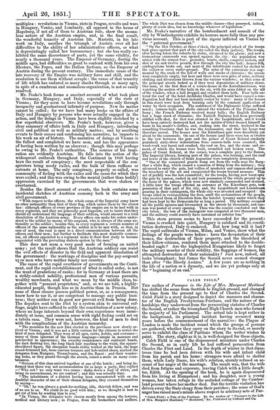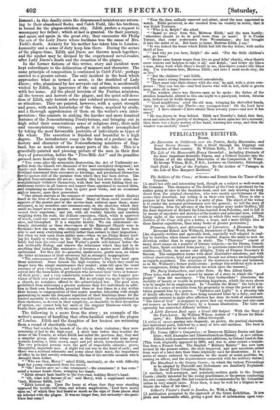CALEB FIELD. * THE author of Passages in the Life of
Mrs. Margaret Maitland has shifted the scene from Scottish to English ground, and changed the time from the present age to that of Charles the Second. Caleb Field is a story designed to depict the manners and charac- ter of the English Presbyterian-Puritans, and the nature of the hardships they underwent from the persecuting statutes of Charles the Second, or rather the triumphant High Church men who formed the majority of his Parliament. The actual tale is kept rather in the background, its principal incident having occurred many years before the commencement of the narrative : the Plague of London is made the incident round which the groups of persons are gathered, whether they carry on the story to its end, or merely serve to exhibit the class of Puritans whom the writer wishes to paint. The story, slight as it is, is well-designed for these objects. Caleb Field is one of the dispossessed ministers under Charles the Second, as in early life he had suffered persecution from Charles the First and Laud. In the depth of winter in that disas- trous time he had been driven with his wife and infant child from his parish and his home : strangers were afraid to shelter them, while Lady Deere, his wife's relation, sternly refused on ac- count of her anger at the marriage. The result was, that the wife died from fatigue and exposure, leaving Caleb with a little daugh- ter, Edith. At the opening of the book, he is again dispossessed from his living at Hampstead ; and his daughter, now a young woman, has taken refuge in the secluded cottage of the Cumber- land peasant where her mother died. But the terrible visitation has driven away the State clergy from their parishes ; the sense of God's anger has raised men's minds above respect to arbitrary acts of Par-
• Caleb Field ; a Tale of the Puritans. By the Author of " Passages in the Lift! of Mrs. Margaret Maitland," Merkland," 8:c. Published by Colburn and Co.
Bement ;. in. trhis deadly.crisis the .dispossessed..ministers are return- ing to their' bandoned flocks, and Caleb Field, like his brethren, ds bound for the plague-stricken city. Edith prefers a request to -accompany her feller ; which at last is granted. On their journey, and again and again in the great city, they -encounter Sir Philip the son of the Lady Dacre whose hardness was 'the cause of Mrs. :Field's death. Anxiety for his mother has taken him to London ; humanity and a sense of duty keep him there. During the scenes of the plague-time, 'Edith and Dacre are thrown much together ; and the upshot may be divined by the experienced novel-reader, after Lady nacre's death and the cessation of the plague. -In the former fictions of this writer, story and incident were kept subordinate-to the delineation of manners and character. The same principle of composition is continued. in Caleb Field ; perhaps tarried to.a greater extent. The only incident in the book which approaches what is termed a scene, is .the deathbed of Lady 'Dacre ; who, abandoned by her servants out of fear, is accidentally 'visited by Edith, in ignorance of the .sad antecedents -connected with her name. All the placid heroism of the Puritan ministers, all the terrors and horrors of the plague, and the quiet self-devo- tion of Edith, only furnish sober and subdued pictures, not scenes or situations. They are painted, however with a quiet strength and grace, with much knowledge of the times, acquired by study, and a thorough apprehension of them on the writer's own inter- :pretation : this consists in sinking the harsher and more fanatical .features of the Nonconforming Presbyterians, and bringing out in thigh relief their conscientious sense of religions duty, their mild and uncomplaining virtues ; perhaps it is rather accomplished by taking the most favourable portraits of individuals as types of the whole. The execution is finished and beautiful to a high -degree. The introductory essay (in the form of a preface) on the history and character of the Nonconforming ministers of Eng- land, has as much interest as many parts of the tale. This is -a gracefully-painted and pleasing picture of the men in their first 'ays of persecution, before the ".Five-Mile Act" and its.penalties ,pressed more heavily upon them.
" Two years after the memorable Restoration, the Act of Uniformity-ex- relied from the. Church two thousand of her most exemplary clergymen ; not kigots—not fanatics—not the bold, strong, .uncompromiqing men, who in %Scotland denounced their successors as hirelings, and proclaimed themselves /lawful pastors still of the parishes from which they had been driven. The „English Nonconformists did not-so : meekly they laid down their arms,
un- wcomplainingly withdrew themselves, with their last words bidding their pa- triehsoners receive in all honour and respect those appointed to succeed them, sand retaliating no otherwise than hy.quiet good works, and an occasional nigh or lament, upon.their persecutors.
One almostmarvels at the romance of conscientiousness which displays litself in the lives of these quaint-divines. :Many of them could receive and approve of the greater part-of the service-book enforced upon them; many remained, as lay members and communicants, in the churches -which they .could no longer serve as ; many-used -voluntarily the liturgy which caused their expulsion ; and yet with -all worldly benefits and comforts
weighing down scale, the delicate conscience, which, while it approved Of much, could not assent and consent' to all, asserted its superior import- ance, and-triumphed. It is a singUlar history. We can understand—in- tensely distasteful as .these observances -of the Episcopal- Church were to ficotland—how .the-men who; strongly resisted them .all -should have been -.able to cast away everything earthly rather than-submit to their imposition ; .but when we look upon these-milder men—when we see.Thilip Henry lead- ing his family to worship in the little Church at Worthenbury, which so lately had been his own—and 'hear Wesleys gentle 'self-defence before the 'not unfriendly Bishop, and observe the reluctance -which they had to do :anything that looked like resistance—it becomes-a matter more -difficult to :understand. Yet they did it—peaceful, unobtrusive, gentle men, on whom ,the bitter nicknames of their adversary fall.so strangely inappropriate.
"The consequences of this English Bartholomew's Day were hard upon 'those ministers. Some forsook the high vocation, in which they could no -longer have the simple maintenance they needed ; some fell upon the usual resource of poor clergymen, and taught schools; while very many were re- ceived into the households of gentlemen who favoured their views or honour- ed their piety ; and a very comfortable number retired to the happier pro- vision of their own private resources. But no attempt was made to organize a church, no resistance offered to the acknowledged law. The good men, prohibited from addressing a greater audience than five individuals in addi- tion to their own households, preached three or four times in a day within .their houses,' to congregations of that scanty .number, labouring- with simple painstaking-to make the frequent repetition of their teachings atone for the limited assembly to which each sermon was delivered. So straightforward in .their obedience, so devout in their simplicity, so charitable in their diversities of opinion, one cannot help but smile at the singular blindness which up- braids these gentle men witlethe name of fanatic."
The following is a scene from the story. ; an example of the writer's manner of handling that often-handled subject the plague of London. Edith and-the daughter Of her 'hostess are-returning from a round of charitable visits.
"They had reached the bounds of the city in their visitation ; -they were vetuming at last by the high-road. A short time before they-reached the .house of the Turners, at whichlEdith had called the previous day, they met
Isingalar group, about whose rear, as .they proceeded with some pomp towards London, a little crowd, eager andset afraid, tremulously hovered. 'The two principal persons wore the garb of respectable citizens ; grave, thoughtful, important men. A slight redrod. was in the hand of each ; and -there was-a subdued-solemnity and pomp about' their mien,- the importance ,,of office in its lint novelty overcoming the fear of the _terrible occasion which -.brought them hither.
" Who are they, Mercy ? ' asked Edith, anxiously, as she with dffficulty 'kept her young companion from the crowd. -4" Oh ! -heaven save us !—the examiners !—the examinera ! it 'has some !' ,cried !a woman beside 'them, wringing-her hands.
"-Edith shrank- baek hastily, to the foot>road, holding hiereys hand. 4, Oh, what will- becomeef us!' said Mercy, with a -suppressed scream ; 'look, Mistress Edith, look!' "Edith looked up. Upon the • house at whose door they were standing -appeared the -terrific-red -erossrand -solemn supplication, 'Lord have mercy -upon ns ' of Schieh they had lieardwo much as the alga of those places shut ,np infected with the plague. It was-no longer fear, but certainty—the pesti- lence had come ! "Near the door, sullenly reserved and eilent, ;stood the man appointed to -'watch. !Edith perceived, as she recoiled from -its vicinity in terror, that.it was Ralph Tennison.
Who is it, Ralph ?' she asked.
" Speed ye away from this, 'Mistress ,Edith,' said the man hastily; 'wherefore should ye be in peril more -than ye need? It is Placebo Turner, that came yestermorn from Westminster ; she has brought it into the midst of us. But haste ye home, Mistress Edith, I say.' "It was indeed the house which Edith had left the day before, with sucha thrill of fear.
"'And why are you here, Ralph?' she -said. 'For the little children's sake, go home.'
" '.Better earn honest wages than live on good folks' charity, when there's enow widows and helpless to take it all,' said Ralph ; and better -die likens a man, doing work while there's breath in me, than starvesonder idle likes dog. I'm watchman here, Mistress Edith ; and here I must needs stay, die or live.'
" But the children ? ' said Edith.
" The man's strong features moved convulsively.
" ' They must take their chance with the rest,' he said, with a stern com- posure: 'they can but die—and God knows who will be left, child or grown man, afore all is done !'
" The -window above-was thrown open es he -spoke : the father of the stricken household, altered in this one night to a paralyzed, broken, fatuous man, looked -out in feeble despair. "':Good. neighbours,' cried the old man, wringing his shrivelled hande, 'pray for my child—my Phcebe—my youngest-born! Oh the Lord have mercy ! I have sinned—I have sinned these seventy years—and now it has come!'
"He was drawn in from behind. Edith saw Dorothy's faded, thin face, stern and calm in the gravity of its despair, look down upon her fora moment; then there was a hasty motion of her hand,-warning her away, and then-the window was carefully closed."



























 Previous page
Previous page